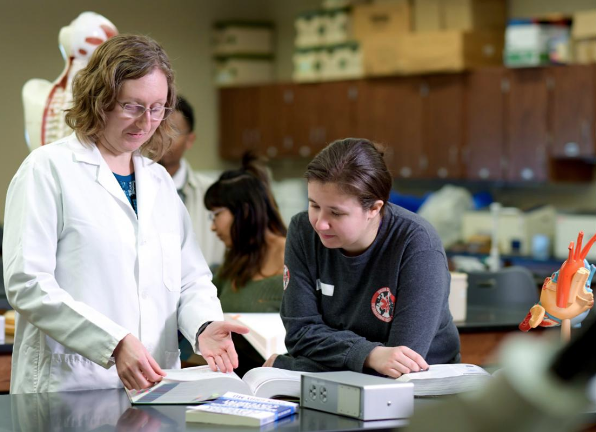Getting into medical school has been hard enough already, but as the number of applicants explodes post-pandemic, the competition is even more fierce.
“It’s getting to the point where having a good GPA isn’t enough,” said Biomedical Science Program director Dr. Christina Burden-Page. “Students have to show themselves better suited to the career than other applicants with the same grades as them.”
Enter Professional Development I and II: a series of classes for students who want to get into a graduate or professional program in the medical field, such as medical school, PA school, dental school, sonography school and many others. While these classes are required for biomedical science majors, they are open to any student who wants to be a competitive applicant and professional.
“We’re focused on making sure that we develop all aspects of a student, not just helping them learn information,” said Burden-Page, who teaches the classes. “We want to provide a holistic development of the students rather than just saying, ‘We’ll offer the coursework, you do the rest.’”
Junior Brynna Taylor is currently taking Professional Development I. She is majoring in both international rescue and relief and biomedical science. “Lately we’ve been working on developing a plan for how we want to develop our leadership and interpersonal skills,” she said. “This class helps a lot with figuring out what I actually want to do and what strategies I need to get to that goal.”
The classes meets for one hour each week. In Professional Development I, students explore professional competencies: the skills they need to succeed in graduate programs and the workplace. “The healthcare field is looking for people not only who are smart, but also who can show they care about someone besides themselves,” said Burden-Page. “They know what the career is like; they’ve actually done shadowing. They’ve shown they can be a leader by having leadership positions and can demonstrate cultural competency — how not to be offensive while dealing with somebody from outside your culture.”
Skills such as reliability, dependability and trustworthiness are as crucial as they are hard to teach. Burden-Page focuses on making students aware of what is necessary for success. “They do a self-assessment and they also have a mentor do an assessment so they can see where they need to grow.”
Professional Development I also teaches students how to navigate the complexities of the medical school application process. Burden-Page gives her students practical tips for shadowing, such as how to arrange shadowing opportunities, how to record their experiences, and how to act while shadowing.
In Professional Development II, the focus is on developing critical thinking and problem-solving skills that students will need for medical school entrance exams. As a class, students work on writing their personal statements, resumes and CVs.
For Taylor, the professional development class series has helped guide her plans for her career. “I’m currently thinking about being an emergency department doctor or working in pediatrics,” she said. “Before this class, most of the careers I could see myself in were based on international rescue and relief. We had an assignment in class to think about backup plans if our first choice for career didn’t work out; that’s a common question to hear from med school interviewers. It started me thinking about what I want to do long-term.”
“I would recommend this class,” said Taylor. “I really like how Dr. Burden-Page has us work in groups and discuss things among ourselves because it’s helpful to see different perspectives. There are a decent amount of assignments, but I love it.”
Annika Cambigue is a junior English and communication major from Ohio.










